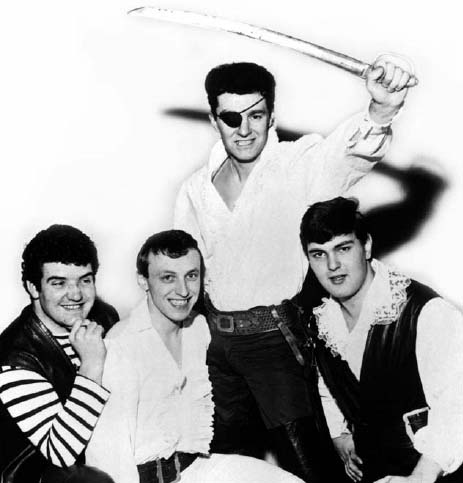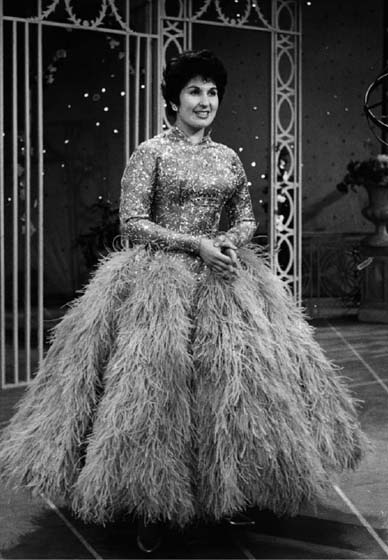The Encyclopedia of Dead Rock Stars (8 page)
Read The Encyclopedia of Dead Rock Stars Online
Authors: Jeremy Simmonds

Bobby Fuller
(second left)
with The Bobby Fuller Four: ‘The Law’ simply wasn’t interested
Like most young Texans, Fuller and his older brother, Randy, were fans of local-boy-made-good Buddy Holly and sought to emulate his success (if not his virtuosity) as soon as they could learn a few basic chords. This they would have achieved, had several events not put paid to The Bobby Fuller Four during their 1966 peak. All had begun well enough, with the teenage Fuller not only running a basic studio set-up in his basement but also graduating from music school; he made various recordings with independent labels before the local-airplay hit ‘King of the Wheels’ (1965) elevated him to the position of cult hero to the growing El Paso garagerock ‘n’ roll crowd. Settling on a Bobby Fuller Four line-up of himself as lead guitarist/vocalist, Randy Fuller (bass), Jim Reese (guitars) and Dwayne Quirico (the first of four short-term drummers, another of whom would be the studio-based Barry White – yes,
that
Barry White), the ambitious frontman relocated his band to the more happening LA. The result was a series of raunchy, stripped-down singles on Mustang, ‘Let Her Dance’, ‘Love’s Made a Fool of You’ and ex-Cricket Sonny Curtis’s seminal ‘I Fought the Law’ – a massive US hit at the beginning of 1966 and, of course, a much-covered standard for decades to follow. But fame was to be short-lived, recording sessions all but capsized by feuding between the two brothers. That summer, Fuller had pretty much made up his mind to dissolve the band and was due to meet with his musicians to tell them of his solo plans, but the meeting never took place. On the afternoon of 18 July, Lorraine Fuller’s missing Oldsmobile suddenly ‘turned up’ in a field next to her apartment on Sunset Strip, Hollywood. In it she found her son Bobby – missing for some fourteen hours – not just dead but in rigor mortis, badly beaten and doused in fuel. Rumours had abounded about Fuller’s mental state – he had recently become mildly depressed with the state of affairs with his band and his relationships (he had fathered a son whom he was not allowed to see) and had also experimented frequently with the then currently popular LSD – and the coroner returned a verdict of suicide by asphyxiation (the suggestion being that he’d ‘drunk’ the petrol), later changed to accidental death. A Hollywood police officer had, for some inconceivable reason, destroyed crucial evidence at the scene such as the gasoline canister. Although officials seemed keen to close the case as soon as possible, Lorraine and Randy Fuller were desperate to pursue what they felt was surely foul play. After all, the brothers weren’t strangers to murder: on a shooting trip in the early sixties, the Fullers’ halfbrother Jack had been gunned down by a purported ‘friend’. But despite apparent oddities in the case, the official statement of ‘no evidence to suggest foul play’ has never been altered. Randy Fuller’s continued pleas – even appearing on NBC’s
Unsolved Mysteries
series – have fallen on deaf ears ever since.

Johnny Kidd (with The Pirates): Could’ve had someone else’s eye out with that
SEPTEMBER
Thursday 1
Leroy Griffin
(New Haven, Connecticut, 5 April 1934)
The Nutmegs

Hailing from New Haven, The Nutmegs were the latest in a seemingly endless line of vocal groups from the area, but they did at least have the distinctive tones of Leroy Griffin at the helm. Griffin fronted the band (alongside his brother Sonny and, for a while, another singer bizarrely also named Leroy Griffin), which enjoyed big US R & B hits with ‘Story Untold’ and the best-known Nutmegs song ‘Ship of Love’ (both 1955) – the latter of which was only prevented from becoming a national pop hit when a simultaneous version emerged by The Crew Cuts.
Griffin’s death in September 1966 will forever remain mysterious. It seems that he and a work colleague had an altercation at a Koppers coke plant where Griffin still occasionally laboured to earn a living. Horrifically, Griffin either fell or was pushed into one of the factory’s giant furnaces, where he was quickly burned to death.
OCTOBER
Friday 7
Johnny Kidd
(Frederick Heath - Willesden, London, 23 December 1939)
Johnny Kidd & The Pirates (The Five Nutters)

Whether he was an influence on Adam Ant is open to conjecture, but Johnny Kidd was the first performer in British pop music to don the panto gear. An early skiffle convert, he formed his own band, The Five Nutters, while still a teenager. When rock ‘n’ roll kicked in, his interest in Lonnie Donegan et al dipped somewhat and he sought a new image – that of seventeenth-century buccaneer Captain William Kidd. The look presaged a name change, too, and had immediate appeal, particularly to HMV, who issued the first Johnny Kidd single, the excellent ‘Please Don’t Touch’ in May 1959. Its Top Thirty placing was a solid but not earth-shattering start, but the label’s next move – to sack the band and bring in experienced hands – was less effective, a series of covers by and large failing to dent the listings. Kidd’s co-written ‘Shakin’ All Over’ (1960), though, was a genuine ‘moment’ in pop-music history and is rightly viewed as the classic British pre-Beatles rock ‘n’ roll record; this infectious stop/start rocker duly took Kidd – now with The Pirates, including top guitarists Alan Caddy and Joe Moretti – to number one that summer. From this, the only direction for a working unit on the label payroll to go was likely to be downwards, and tunes that disappointingly pushed this distinctive band into a ‘Merseybeat’ direction were largely misses (1963’s ‘I’ll Never Get Over You’ a notable exception). Kidd was a hard-worker, however, and he and his group would still kick up something of a storm on their exhaustive live schedule, with occasional support from The Who – a band that has consistently cited him as an influence.

Alma Cogan: Her ‘ostrich look’ never caught on
With a fresh line-up, Johnny Kidd & The New Pirates were on the road again in October 1966 when tragedy – or, more truthfully, a skidding lorry – struck. The recently married Kidd was travelling in the tour van to an engagement when he was killed in the crash on the M1 near Radcliffe, just outside Bury, Lancashire. The remainder of the band, all of whom survived the accident, continued touring as The Pirates, and bass-player Nick Simper went on to join Deep Purple in the seventies.
See also
Alan Caddy ( August 2000); Mick Green (Golden Oldies #104)
August 2000); Mick Green (Golden Oldies #104)
Wednesday 26
Alma Cogan
(Alma Angela Cohen - Stepney, London, 19 May 1932)

If there weren’t many British pop and rockabilly acts around during the fifties, female artists were in even shorter supply. But Alma Cogan was one such artist who positively thrived in this era, her voice equally at home in both adult and teenage markets. Brought up in Worthing, Sussex, Cogan attended art school, though it was her singing that caught the attention of Ted Heath (the bandleader) before HMV gave her an opportunity to record in 1952. Cogan’s stage presence was also quickly noted, earning her a residency on the BBC radio show
Take It from Here.
The singer’s soon-widely-recognized love of garish clothing would be acknowledged in her first hit record, the Top Five ‘Bell Bottom Blues’ (1954), which began an impressive run of twenty-two chart successes, culminating with ‘Dreamboat’, a chart-topper from 1955. Cogan’s hits – which had pretty much descended into pop novelties by the start of the next decade – dried up by 1961, as acts such as the younger Helen Shapiro began to come through. There was still the staple cabaret circuit, which she pursued for several years, and it was at one such date in Sweden in the autumn of 1966 that Cogan mysteriously collapsed. Rushed to hospital, the 34-year-old vocalist was diagnosed with throat cancer; within weeks she was admitted to the Middlesex Hospital, where, shortly thereafter, she passed away.